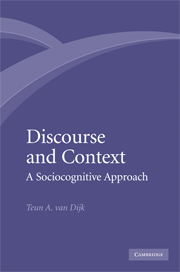5 - Conclusions
Published online by Cambridge University Press: 22 September 2009
Summary
Although it is generally recognized that context plays a fundamental role in the production, properties and comprehension of discourse, theories and analyses of context have been scarce. Contexts tend to be conceptualized intuitively in terms of properties of communicative situations, such as the gender, age, class or ethnicity of the speakers. Moreover, where the influence of context is being studied, for instance, in sociolinguistics, anthropology and Critical Discourse Analysis, it is generally assumed that these properties of social situations have a direct impact on the structures of text and talk.
In this book a more explicit and empirically more satisfactory theory has been presented that defines contexts in terms of subjective mental models – context models, of participants. Such a theory avoids the determinism of direct social influences or causation, accounts for differences among speakers, and hence accounts for the uniqueness of all discourse and discourse comprehension, even in the "same" social situation, offering a much more sophisticated analysis of the complex structures of contextual influence on text and talk.
This study shows first that most researchers in the humanities and social sciences after World War II engaged in structuralist, formalist and autonomous theories focusing on text, talk, signs, literature or art itself, thereby largely ignoring the social and cultural environments of language and discourse.
Information
- Type
- Chapter
- Information
- Discourse and ContextA Sociocognitive Approach, pp. 217 - 225Publisher: Cambridge University PressPrint publication year: 2008
